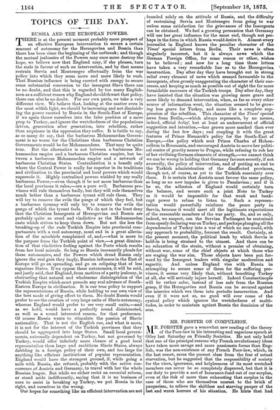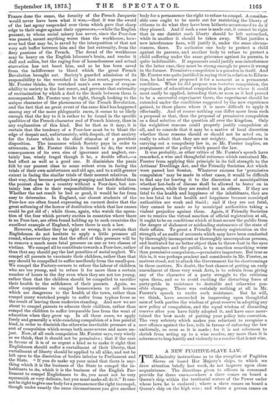MR. FORSTER ON COMPULSION.
MR. FORSTER gave a somewhat new reading of the theory of the Poor-law in his interesting and sagacious speech at Otley last Saturday on Friendly Societies. He not only held that one of the principal reasons why French revolutionary ideas have taken more savage and more passionate forms than Eng- lish, was the non-existence of any French Poor-law, which, in the last resort, saves the poorest class from the fear of actual starvation, but he suggested that the responsibility of society for the vices, ignorance, and helplessness of its most wretched members can never be so completely disproved, but that it is our duty to provide a sort of Insurance-fund out of our surplus, even at the risk of more than exhausting that surplus in the case of those who are themselves nearest to the brink of pauperism, to relieve the shiftless and starving pauper of the last and worst horrors of his situation. He hints that had
France done the same, the ferocity of the French Jacquerie would never have been what it was,—that it was the sword of the last agony suspended over them which gave that sharp edge to their anger against their oppressors,—while the English peasant, to whom social misery has never, since the Poor-law was passed, meant anything worse than the workhouse, how- ever bad that may be, is saved by the interposition of that not very soft buffer between him and the last extremity, from the fiery passions of the French. The dread of the workhouse may be heavy on the English labourer's brain, and render it dull and sullen, but the raging fear of homelessness and actual starvation has not beset him, and so he has been saved from the indifference to blood which the great French Revolution brought out. Society's guarded admission of its responsibility to the wretched in the last resort, preserves, as Mr. Forster thinks, the wretched man's own sense of respon- sibility to society in the last resort, and prevents that extremity of recrimination by which a duel to the death between them is accompanied. Mr. Forster may be right, though looking to the unique character of the phenomena of the French Revolution, and the fact that no great event of the same kind has happened among any of the more phlegmatic races, it seems to us likely enough that the key to it is rather to be found in the specific qualities of the French character and of French history, than in any explanation of this kind. But be that as it may, it is certain that the tendency of a Poor-law must be to blunt the edge of despair and, unfortunately, with despair, of that anxiety for the future which is the chief stimulus of a provident disposition. The insurance which Society pays in order to attenuate, as Mr. Forster thinks it bound to do, the worst consequences of its own sins of ignorance and neglect, cer- tainly has, wisely frugal though it be, a double effect,—a bad effect as well as a good one. It diminishes the panic felt by our poorest class to some extent even in facing the trials of their own misfortunes and old age, and to a still greater extent in facing the similar trials of their nearest relatives. In that way, they become perhaps less grasping and hard-fisted than the poorest class in a country without a Poor-law, but cer- tainly less alive to their responsibilities for their relatives. Whether the net result be bad or good, it would be far from easy to determine. In England, our closest students of the Poor-law are often found expressing an earnest desire that the great softening of the horror of destitution which that law causes could be got rid of ; while those, again, who watch the opera- tion of the fear which poverty excites in countries where there is no Poor-law, are often found holding up to such countries the excellent example of England, where there is such a law.
However, whether they be right or wrong, it is certain that Englishmen do not hesitate to apply a little pressure all round, wherever they see that the effect of this pressure will be to remove a much more fatal pressure on one or two classes of victims. We compel all to contribute towards a Poor-law, rather than that any should pay the last penalties of social neglect. We compel all parents to vaccinate their children, rather than that any should be compelled to suffer needlessly from the small-pox. We compel the Factory-owners to refuse the labour of children who are too young, and to refuse it for more than a certain number of hours in the day even when they are not too young, rather than that the children should be compelled to sacrifice their health to the selfishness of their parents. Again, we allow corporations to compel houseowners to sell houses which are dangerous to the health of the town, rather than compel many wretched people to suffer from typhus fever as the result of leaving these rookeries standing. And now we are about to compel parents to educate their children, rather than compel the children to suffer irreparable loss from the want of education when they grow up. In all these cases, we apply freely and generally a wide-reaching compulsion of a less painful kind, in order to diminish the otherwise inevitable pressure of a sort of compulsion which seems both more severe and more un- just. Now, of all such compulsion Mr. Forster says, very wisely as we think, that it should not be permissive ; that if the case in favour of it is of so urgent a kind as to make it right that Englishmen should suffer a curtailment of their liberty, that curtailment of liberty should be applied to all alike, and not be left open to the discretion of bodies inferior to Parliament and the State. "If you do make up your mind that there is any- thing which it is the business of the State to compel the in- habitants to do, which it is the business of the English Par- liament to compel Englishmen to do, you must not be very squeamish or very delicate, but you must make all do it." It can- not be right to give one body fora permanence the right to compel, though under exactly the same circumstances you give another
body for a permanence the right to refuse to compel. A consider- able case ought to be made out for restricting the liberty of citizens to do what they have been hitherto accustomed to do if they pleased. And if such a case is made out, it cannot be right that in one district such liberty should be left untouched, while in another it should be taken away. What justifies a new interference here, will justify it, under the same circum- stances, there. To authorise one body to protect a child against its parents, and another body to refuse to protect a child suffering under the same grievance against its parents, is quite indefensible. If arguments could justify non-interference in the latter case, they must be strong enough to prove it wrong in the former. Permissive compulsion is a paradox in itself. And Mr. Forster was quite justified in saying that in relation to Educa- tion, he had never proposed it for a moment as a permanent condition. What he did propose was tentative compulsion, the experiment of educational compulsion in places where it could most easily be applied, intending that, as soon as it had proved to be a successful experiment there, the experiment should be extended under the conditions suggested by the new experience gained, to those places where it is more difficult to apply it effectually. And of course nothing can differ more from such a proposal as that, than the proposal of permissive compulsion as a final solution of the question all over the kingdom. Only the weightiest reasons could properly justify compulsion at all, and to concede that it may be a matter of local discretion whether those reasons should or should not be acted on, is really to admit that they are not weighty. Squeamishness in carrying out a compulsory law is, as Mr. Forster implies, an arraignment of the policy which passed the law.
It was probably, as other critics of Mr. Forster's speech have remarked, a wise and thoughtful reticence which restrained Mr. Forster from applying this principle in its full strength to the Artisans' Dwellings Act, and the Friendly Societies Act which were passed last Session. Whatever excuses for 'permissive compulsion' may be made in other cases, it would be difficult to find any for leaving it to the discretion of municipalities whether hot-beds of disease shall be allowed to fester on in some places, while they are rooted out in others. If they are fatal to the health and happiness of the inhabitants, they are no less fatal to that health and happiness because municipal authorities are weak and timid ; and if they are not fatal, they cannot be made so by municipal authorities taking a violent prejudice against them. Again, if Friendly Societies are to receive the virtual sanction of official registration at all, it ought to be on conditions which at least secure the public from the danger of dishonest or misleading statements of the state of their affairs. To grant a Friendly Society registration on the strength of an audit of accounts which may have been conducted by thoroughly incompetent or thoroughly unscrupulous persons, and instituted for no better object than to throw dust in the eyes of its members and the public, is to sanction something worse than permissive compulsion,—permissive imposture. But true as this is, it was perhaps prudent and considerate in Mr. Forster, as matters stood, not to attack the Government for its shortcomings in these matters. No doubt, the best chance of getting an early amendment of these very weak Acts, is to refrain from giving any of the character of a party struggle to the criticism upon them, and so to avoid exciting the disturbing force of party-pride in resistance to desirable and otherwise pos- sible changes. There was certainly nothing at all in Mr. Forster's speech to excite such resistance. But he will, we think, have succeeded in impressing upon thoughtful men of both parties the wisdom of great reserve in adopting any new policy of compulsion, and the equal wisdom of discarding reserve after you have fairly adopted it, and have once ascer- tained the best mode of putting your policy into execution. The very sobriety which makes you reluctant to recognise a new offence against the law, tells in favour of enforcing the law uniformly, so soon as it is made ; for it is not soberness to shrink from acting up to a wise resolve, any more than it is soberness to leap hastily and violently to a resolve that is not wise.































 Previous page
Previous page